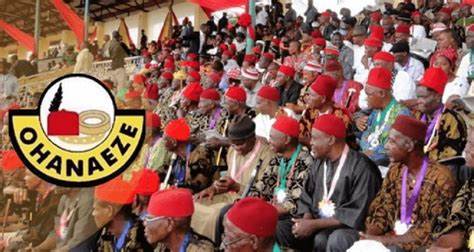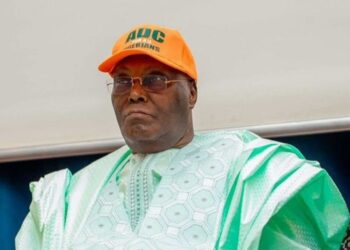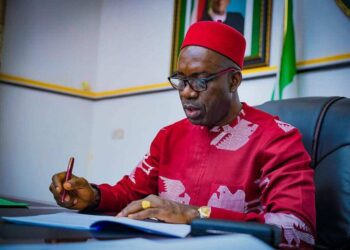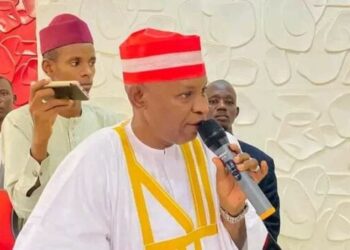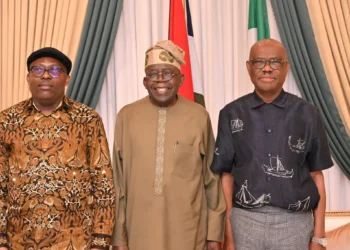The apex Igbo socio-cultural organization, Ohanaeze Ndigbo, has declared that no person of Igbo extraction will challenge President Bola Ahmed Tinubu in the 2027 presidential election, instead setting sights on securing the presidency for the Southeast region in 2035.
The announcement came through a weekend statement from the organization’s leadership, with Deputy President General Mazi Okechukwu Isiguzoro and National Spokesman Thompson Ohia explaining that the decision emerged from strategic consultations with Southeast political leaders, including members of the Imeobi and Nzukoumunna councils.
The Igbo leadership group revealed that their strategic planning indicates 2035 as the most viable timeline for achieving an Igbo presidency, contingent on potential changes to Nigeria’s political zoning arrangements. Central to their long-term strategy is positioning the All Progressives Congress as the primary vehicle for Igbo presidential aspirations.
In identifying potential candidates for this future bid, Ohanaeze Ndigbo specifically highlighted Minister of Works Senator David Umahi as their preferred standard-bearer, praising his governmental experience and leadership credentials. The organization noted that Umahi’s background as a former governor, his role as Chairman of the Southeast Governors Forum, and his current federal ministerial position make him uniquely qualified to lead such an initiative.
The statement emphasized that achieving Igbo presidential ambitions requires building strategic partnerships across Nigeria’s diverse ethnic landscape, suggesting that the 2027 election cycle does not present optimal conditions for such coalition-building.
Rather than opposing Tinubu’s anticipated re-election campaign, Ohanaeze Ndigbo announced their intention to mobilize Southeast support for the incumbent president. The organization projected that approximately 95 percent of Igbo voters would back Tinubu’s second-term bid, representing a significant shift in regional political alignment.
The group acknowledged the wealth of presidential material within Igbo political circles, mentioning several prominent figures including former Labour Party candidate Peter Obi, Delta State’s Ifeanyi Okowa, former Senate President Pius Anyim, Imo Governor Hope Uzodinma, Anambra Governor Chukwuma Soludo, and former Imo Governor Rochas Okorocha, among others.
However, their endorsement of Umahi reflects a calculated assessment of political viability and strategic positioning within Nigeria’s current political framework. The organization expressed confidence that each of these leaders possesses the capacity to drive national transformation and position Nigeria as Africa’s economic leader.
The timing of Ohanaeze Ndigbo’s announcement appears strategically calculated around expectations of Nigeria’s power rotation cycle. The group anticipates that following Tinubu’s potential second term ending in 2031, political power would likely return to Northern Nigeria, creating an opening for Southeast aspirations in 2035.
This projection represents a significant departure from previous Igbo political strategies that have often involved challenging the established political order through opposition parties. The new approach suggests a more pragmatic engagement with Nigeria’s dominant political structures.
The organization’s statement reflects broader conversations within Igbo political circles about the most effective pathway to national leadership. By explicitly ruling out 2027 presidential challenges, they appear to be prioritizing long-term strategic positioning over immediate political gratification.
The decision also signals recognition of current political realities, including the need to build trust and strategic alliances across Nigeria’s complex ethnic and regional divisions. This approach marks a departure from previous cycles where Igbo candidates often emerged from opposition platforms.
Political observers suggest that this strategic patience could potentially strengthen Igbo claims to national leadership by demonstrating commitment to Nigeria’s informal power-sharing arrangements while positioning key figures within the ruling party structure.
The announcement is likely to influence Southeast political calculations in the coming years, potentially affecting how ambitious Igbo politicians position themselves within Nigeria’s evolving political landscape. It also raises questions about how other regional groups will respond to this strategic repositioning by one of Nigeria’s major ethnic constituencies.

